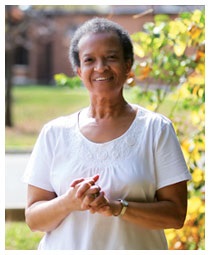Karen’s Story: Advanced Uterine Cancer Treatment Readily Available
 After being diagnosed with
uterine cancer, Karen McKenzie was relieved to find that all of the care and treatment she needed to fight the disease was available at Miami Valley Hospital.
After being diagnosed with
uterine cancer, Karen McKenzie was relieved to find that all of the care and treatment she needed to fight the disease was available at Miami Valley Hospital.
The best advice Karen received after being diagnosed came from her pastor. “I called him right after I’d told my husband and family about the cancer, and read my Bible,” she recalls. “He said, ‘Now, you know God’s got this. Just be sure to follow through with whatever your doctors tell you to do.’”
That’s exactly what Karen did. At her gynecologist’s recommendation, she made an appointment at Miami Valley Hospital. After reviewing her case, the gynecologic oncologist told Karen he needed to operate as soon as possible to remove her uterus and any affected lymph nodes. He recommended robotic surgery, which provides surgeons an excellent view of the cancer and greater precision in removing it, and reduces pain and recovery time for patients.
Karen agreed with the recommendation. The surgery took place about a week later, in July 2010. Although the surgery went smoothly, the news wasn’t good.
The cancer had spread to the lymph nodes on Karen's aorta and vena cava, which are the large blood vessels that deliver blood to and from the heart. During surgery, all of Karen’s cancerous cells were removed. But it was assumed that there were more that couldn’t be seen, and she would need follow-up treatment to eradicate the nonvisible cancer cells.
An Important Decision
With the surgery behind her, Karen had a choice to make. The standard of care for someone in her situation is to undergo a combination of radiation therapy and chemotherapy. However, her physician felt she was a good candidate for a clinical research study that measures the effectiveness of chemotherapy alone versus the combination therapy.
In this study, participants are randomly assigned to receive either chemotherapy or the combination therapy. Karen’s physician believed she would benefit from either treatment method.
Karen agreed to participate. She was randomly placed in the group receiving chemotherapy only. Her course of treatment included six chemotherapy infusions spaced three weeks apart.
“When I came in for my first session, everything just hit me, and I started crying,” recalls Karen. “One of the chemo nurses, Sandy Lunsford, came over and took my hand and said, ‘When you want to talk, I’m here. Keep the faith.’ After that day, I never cried again. I could tell that God was using people like Sandy to get me through.”
A Comprehensive Approach
Founded by William Nahhas, MD, of Wright State Physicians Gynecology Oncology Center in 1983, Miami Valley’s gynecologic oncology center is designed to meet the needs of women with gynecological cancer (found in the uterus, cervix, ovaries, vagina, and vulva).
“We provide every aspect of care, from screening and prevention to treatment, follow-up, genetic counseling, and research,” says Dr. Nahhas. “We are well-versed in handling whatever issues our patients may face, from emotional difficulties to complications that arise from treatment.”
Karen credits the staff with keeping her spirits up and helping her manage the effects of chemotherapy, which included fatigue and hair loss.
“Ellen Cato, one of the nurses, would email me every so often to see how I was doing and remind me to eat right,” Karen says. “That kind of encouragement, along with my faith in God, got me through.”
Now, more than a year after her final chemo treatment, Karen feels great. She has returned to her job as a librarian at Blairwood Elementary in Dayton, and is back to the activities she enjoys, including walking and volunteering at her church. To show her appreciation for the gynecologic oncology center’s role in her recovery, this mother of six and grandmother of eight crocheted footies for the staff – two pairs each.

William Nahhas, MD
View Profile
Contact Us
Call the Premier Health cancer hotline at (844) 316-HOPE(844) 316-4673 (4673), Monday through Friday, 8 a.m. to 5 p.m., to connect with a Premier Health cancer navigator.

